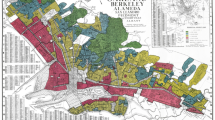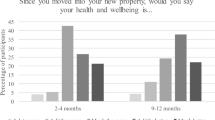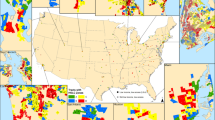Abstract
This paper examines the ways in which a lack of adequate housing and welfare provision for people with different kinds and degrees of disabilities reinforces their marginalization and dependency on carers, support agencies and the State. This paper argues that even though most people have to rely on others for help and assistance at some point in their lives, the ways in which dependency and disability are socially constructed reproduce the marginalization of people with disabilities. Drawing on findings from qualitative research with people with disabilities and family carers in urban and regional Victoria, Australia, this article explores how this lack of adequate housing and welfare provision reinforces the dependency of people with disabilities through low incomes, unsuitable housing design and poor housing conditions, restrictions in terms of location and place, and the lack of suitable care and assistance.
Similar content being viewed by others
References
Australian Institute of Health and Welfare (AIHW). (2005). Australia’s welfare 2005. Canberra: AIHW.
Barnes, C. (1991). Disabled people in Britain and discrimination: A case for anti-discrimination legislation. London: Hurst.
Barnes, C., & Mercer, G. (Eds.). (1996). Exploring the divide: Illness and disability. Leeds: Disability Press.
Beer, A., Faulkner, D., & Gabriel, M. (2006) 21st century housing careers and Australia’s housing future: Literature review. National research venture 2, research paper 1. Melbourne: Australian Housing and Urban Research Institute.
Bleasdale, M. (2007). Supporting the housing of people with complex housing needs. Final report. Melbourne: Australian Housing and Urban Research Institute.
Bostock, L., & Gleeson, B. (2004). Contested housing landscapes? Social inclusion, deinstitutionalisation and housing policy in Australia. Australian Journal of Social Issues, 39(1), 41–62.
Bostock, L., Gleeson, B., McPherson, A., & Pang, L. (2000). Deinstitutionalisation and housing futures: Positioning paper. Melbourne: University of New South Wales and University of Western Sydney Research Centre, Australian Housing and Research Institute.
Bostock, L., Gleeson, B., McPherson, A., & Pang L. (2001). Deinstitutionalisation and housing futures: Final report. Melbourne: University of New South Wales and University of Western Sydney Research Centre, Australian Housing and Research Institute.
Bridge, C., Kendig, H., Quine, S., & Parsons, A. (2002). Housing and care for younger and older adults with disabilities. Final report. Melbourne: Australian Housing and Urban Research Institute.
Casas, I. (2007). Social exclusion and the disabled: An accessibility approach. Professional Geographer, 59(4), 463–477.
Clarke, P., & George, L. (2005). The role of the built environment in the disablement process. American Journal of Public Health, 95(11), 1933–1939.
COAG Reform Council. (2010). National Disability Agreement: Baseline Performance Report for 2008-09. Report to the council of Australian governments. Canberra: Council of Australian Government Reform Council.
Crow, L. (1996). ‘Including all of our lives: Renewing the social model of disability. In J. Morris (Ed.), Encounter with strangers: Feminism and disability (pp. 206–226). London: Women’s Press.
Friedman, M. (1985). Care and context in moral reasoning. In C. Harding (Ed.), Moral dilemmas: Philosophical and psychological issues in the development of moral reasoning (pp. 25–42). Chicago: Precedent.
Friedman, M. (1993). Beyond caring: The de-moralization of gender. In M. J. Larrabee (Ed.), An ethic of care: Feminist and interdisciplinary perspectives (pp. 258–273). New York: Routledge.
Gilligan, C. (1982). In a different voice: Psychological theory and women’s development. Cambridge, MA: Harvard University Press.
Harrison, M. (2004). Defining housing quality and environment: Disability, standards and social factors. Housing Studies, 19(5), 691–708.
Harrison, M., & Davis, C. (2001). Housing, social policy and difference: Disability, ethnicity, gender and housing. Bristol: Policy Press.
Heywood, F. (2005). Adaptation: Altering the house to restore the home. Housing Studies, 20(4), 531–547.
Imrie, R. (2004). Housing quality, disability and domesticity. Housing Studies, 19(5), 685–690.
Imrie, R., & Hall, P. (2001). An exploration of disability and the development process. Urban Studies, 38(2), 333–350.
Keith, L., & Morris, J. (1995). Easy targets: A disability rights perspective on the “children as carers” debate. Critical Social Policy, 44(5), 36–57.
Lloyd, M. (2001). The politics of disability and feminism: Discord or synthesis. Sociology, 35(3), 715–728.
Maddison, F. (1998). Disability, institutional reform and de-institutionalisation: The queensland experience. Unpublished MA thesis, Department of Anthropology and Sociology, University of Queensland.
Oliver, M. (1990). The politics of disablement. London: Macmillan.
Parr, H., & Butler, R. (1999). New geographies of illness, impairment and disability. In H. Parr & R. Butler (Eds.), Mind and body spaces: Geographies of illness, impairment and disability (pp. 1–23). London: Taylor and Francis.
Quibell, R. (2004). The living history project: The lived experiences of people with disability and parents of people with a disability in the period 1981–2002. Scope Vic Ltd.
Saugeres, L. (2008). 21st century housing careers of people with a disability and carers: A qualitative study. National research venture 2. AHURI Southern Research Centre: Adelaide.
Saunders, P. (2005). ‘The impact of disability on poverty and living standards’, paper presented to Australian social policy conference. Sydney: University of New South Wales, 20–22 July.
Sevenhuijsen, S. (1998). Citizenship and the ethics of care: Feminist considerations on justice, morality and politics. London: Routledge.
Shakespeare, T. (2000). Help. Newcastle: Venture Press.
Victorian Auditor-General. (2008). Accommodation for people with disability. Melbourne: Victorian Government.
Victorian Government. (2010). Practical and accessible homes for all Victorians. Melbourne: Build For Life, Victorian Government.
Wiesel, I., & Fincher, R. (2009). The choice agenda in disability housing provision. Housing Studies, 24(5), 611–627.
Young, I. M. (2000). Five faces of oppression. In M. Adams, W. J. Blumenfeld, R. Castaneda, H. W. Hackman, M. L. Peters, & X. Zuniga (Eds.), Readings for diversity and social justice: An anthology on racism, sexism, anti-semitism, heterosexism, classism, and ableism (pp. 35–49). London: Routledge.
Acknowledgments
I would like to thank Kath Hulse and Kathy Arthurson for their comments on earlier versions of this paper. I also wish to acknowledge the Australian Housing and Urban Research Institute which provided funding for the research on which this article was based. The views expressed in this article are those of the author not the Institute.
Author information
Authors and Affiliations
Corresponding author
Rights and permissions
About this article
Cite this article
Saugeres, L. (Un)accommodating disabilities: housing, marginalization and dependency in Australia. J Hous and the Built Environ 26, 1–15 (2011). https://doi.org/10.1007/s10901-010-9201-x
Received:
Accepted:
Published:
Issue Date:
DOI: https://doi.org/10.1007/s10901-010-9201-x




